Entrepreneurship: Impact of Small Businesses & Start-ups on Economy
VerifiedAdded on 2023/01/23
|10
|2395
|68
Report
AI Summary
This report provides an analysis of entrepreneurial ventures, focusing on the different types of ventures such as survival, lifestyle, managed growth, and aggressive growth ventures, and their similarities and differences. It examines the economic motives behind these ventures and presents data and statistics highlighting the impact of micro and small businesses on the economy, including their role in job creation, productivity, and innovation. The report also discusses the importance of small businesses and start-ups in the growth of the social economy, particularly in the context of Brexit and its effects on the UK economy. It concludes by emphasizing the contribution of start-ups and small businesses to economic growth, job creation, and innovation, as well as their role in improving the balance of payments and overall standard of living. Desklib provides access to similar reports and solved assignments for students.
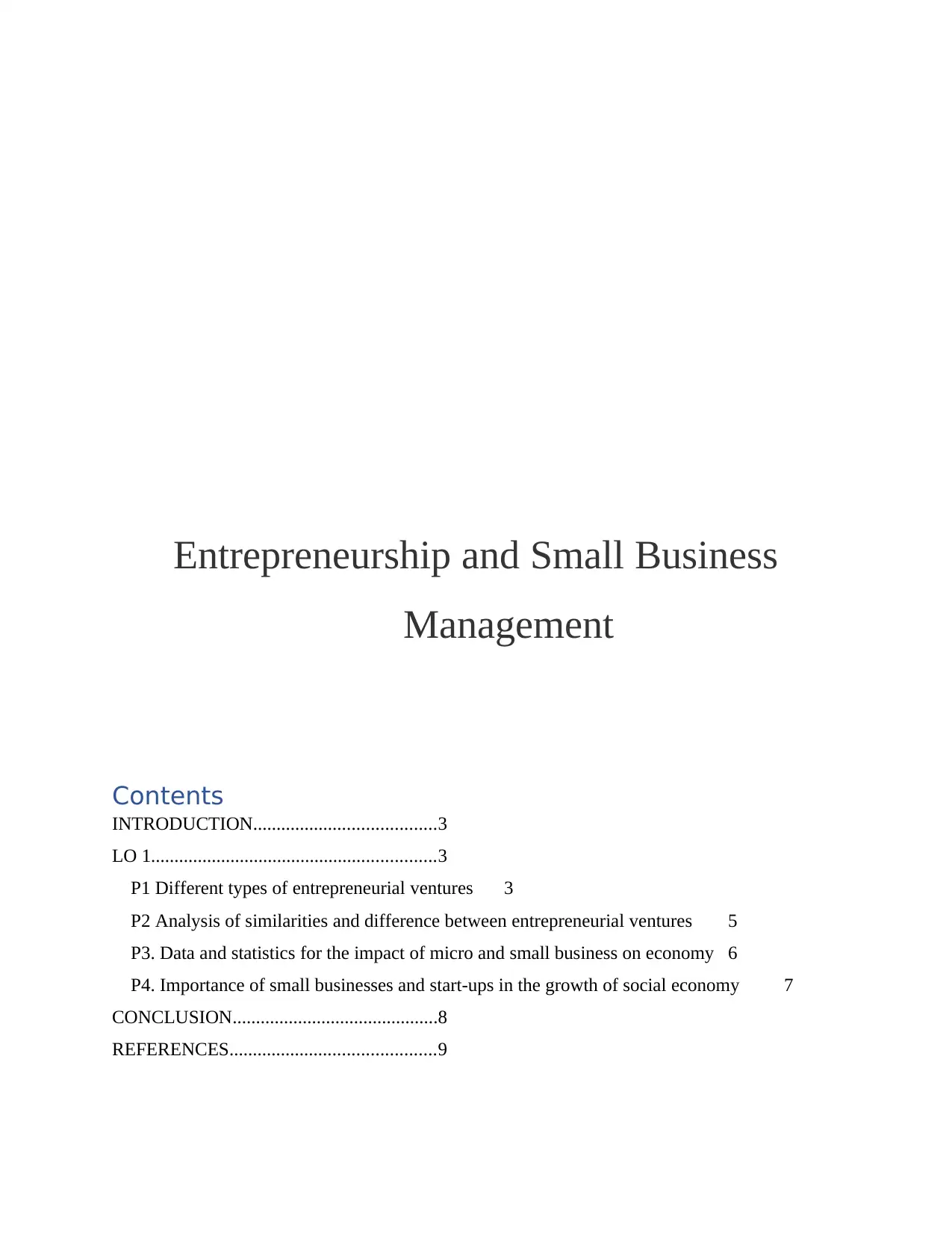
Entrepreneurship and Small Business
Management
Contents
INTRODUCTION.......................................3
LO 1.............................................................3
P1 Different types of entrepreneurial ventures 3
P2 Analysis of similarities and difference between entrepreneurial ventures 5
P3. Data and statistics for the impact of micro and small business on economy 6
P4. Importance of small businesses and start-ups in the growth of social economy 7
CONCLUSION............................................8
REFERENCES............................................9
Management
Contents
INTRODUCTION.......................................3
LO 1.............................................................3
P1 Different types of entrepreneurial ventures 3
P2 Analysis of similarities and difference between entrepreneurial ventures 5
P3. Data and statistics for the impact of micro and small business on economy 6
P4. Importance of small businesses and start-ups in the growth of social economy 7
CONCLUSION............................................8
REFERENCES............................................9
Paraphrase This Document
Need a fresh take? Get an instant paraphrase of this document with our AI Paraphraser

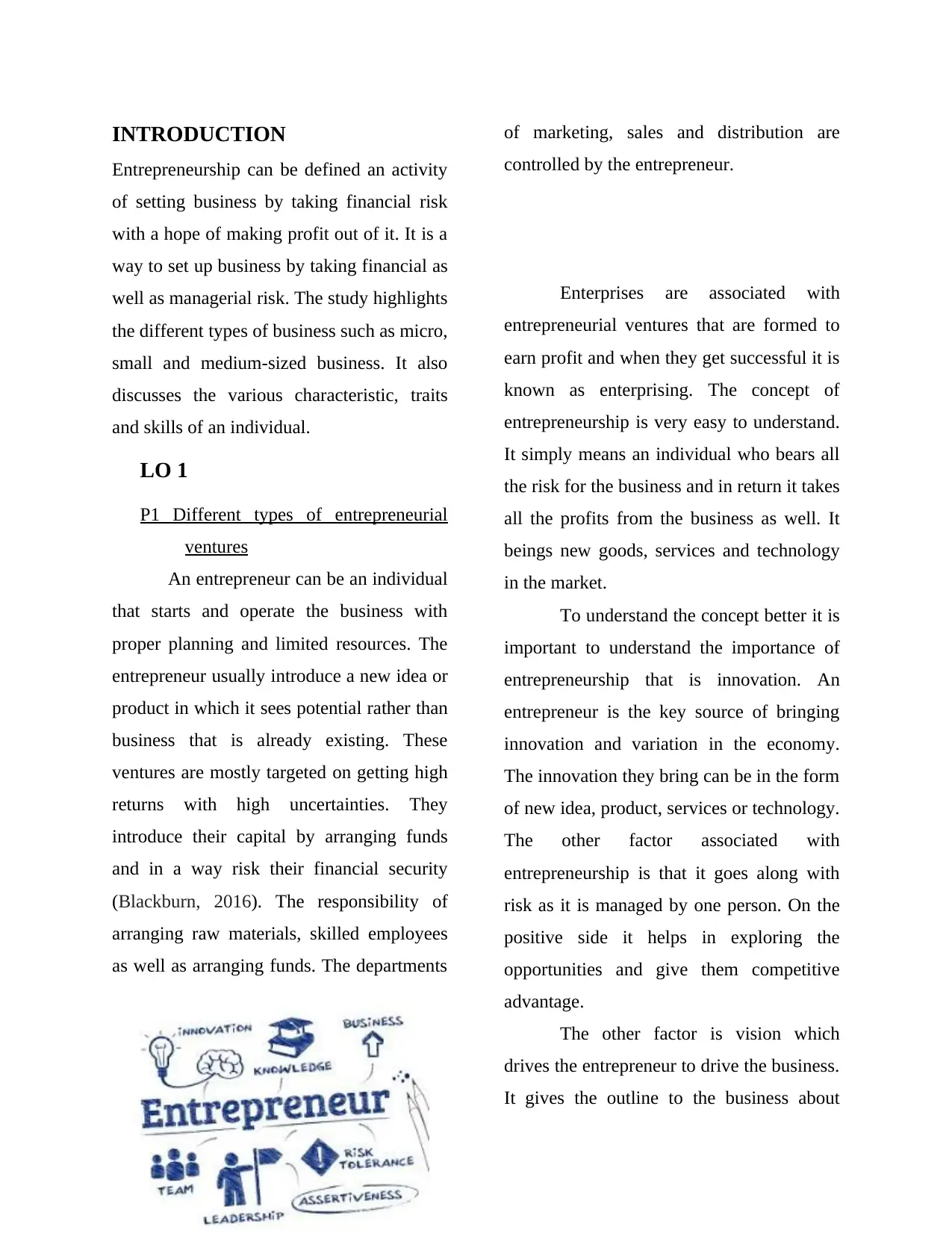
INTRODUCTION
Entrepreneurship can be defined an activity
of setting business by taking financial risk
with a hope of making profit out of it. It is a
way to set up business by taking financial as
well as managerial risk. The study highlights
the different types of business such as micro,
small and medium-sized business. It also
discusses the various characteristic, traits
and skills of an individual.
LO 1
P1 Different types of entrepreneurial
ventures
An entrepreneur can be an individual
that starts and operate the business with
proper planning and limited resources. The
entrepreneur usually introduce a new idea or
product in which it sees potential rather than
business that is already existing. These
ventures are mostly targeted on getting high
returns with high uncertainties. They
introduce their capital by arranging funds
and in a way risk their financial security
(Blackburn, 2016). The responsibility of
arranging raw materials, skilled employees
as well as arranging funds. The departments
of marketing, sales and distribution are
controlled by the entrepreneur.
Enterprises are associated with
entrepreneurial ventures that are formed to
earn profit and when they get successful it is
known as enterprising. The concept of
entrepreneurship is very easy to understand.
It simply means an individual who bears all
the risk for the business and in return it takes
all the profits from the business as well. It
beings new goods, services and technology
in the market.
To understand the concept better it is
important to understand the importance of
entrepreneurship that is innovation. An
entrepreneur is the key source of bringing
innovation and variation in the economy.
The innovation they bring can be in the form
of new idea, product, services or technology.
The other factor associated with
entrepreneurship is that it goes along with
risk as it is managed by one person. On the
positive side it helps in exploring the
opportunities and give them competitive
advantage.
The other factor is vision which
drives the entrepreneur to drive the business.
It gives the outline to the business about
Entrepreneurship can be defined an activity
of setting business by taking financial risk
with a hope of making profit out of it. It is a
way to set up business by taking financial as
well as managerial risk. The study highlights
the different types of business such as micro,
small and medium-sized business. It also
discusses the various characteristic, traits
and skills of an individual.
LO 1
P1 Different types of entrepreneurial
ventures
An entrepreneur can be an individual
that starts and operate the business with
proper planning and limited resources. The
entrepreneur usually introduce a new idea or
product in which it sees potential rather than
business that is already existing. These
ventures are mostly targeted on getting high
returns with high uncertainties. They
introduce their capital by arranging funds
and in a way risk their financial security
(Blackburn, 2016). The responsibility of
arranging raw materials, skilled employees
as well as arranging funds. The departments
of marketing, sales and distribution are
controlled by the entrepreneur.
Enterprises are associated with
entrepreneurial ventures that are formed to
earn profit and when they get successful it is
known as enterprising. The concept of
entrepreneurship is very easy to understand.
It simply means an individual who bears all
the risk for the business and in return it takes
all the profits from the business as well. It
beings new goods, services and technology
in the market.
To understand the concept better it is
important to understand the importance of
entrepreneurship that is innovation. An
entrepreneur is the key source of bringing
innovation and variation in the economy.
The innovation they bring can be in the form
of new idea, product, services or technology.
The other factor associated with
entrepreneurship is that it goes along with
risk as it is managed by one person. On the
positive side it helps in exploring the
opportunities and give them competitive
advantage.
The other factor is vision which
drives the entrepreneur to drive the business.
It gives the outline to the business about
⊘ This is a preview!⊘
Do you want full access?
Subscribe today to unlock all pages.

Trusted by 1+ million students worldwide
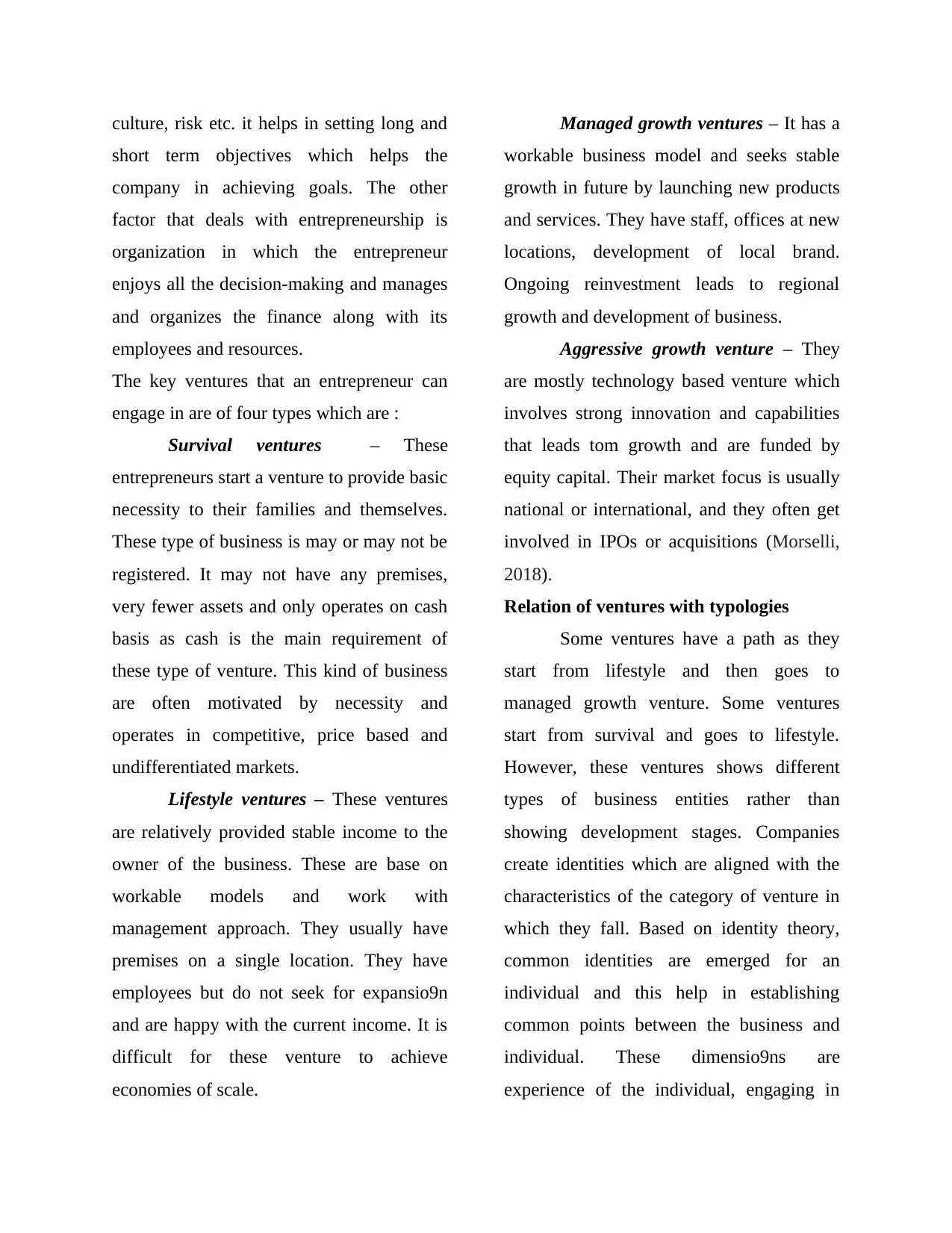
culture, risk etc. it helps in setting long and
short term objectives which helps the
company in achieving goals. The other
factor that deals with entrepreneurship is
organization in which the entrepreneur
enjoys all the decision-making and manages
and organizes the finance along with its
employees and resources.
The key ventures that an entrepreneur can
engage in are of four types which are :
Survival ventures – These
entrepreneurs start a venture to provide basic
necessity to their families and themselves.
These type of business is may or may not be
registered. It may not have any premises,
very fewer assets and only operates on cash
basis as cash is the main requirement of
these type of venture. This kind of business
are often motivated by necessity and
operates in competitive, price based and
undifferentiated markets.
Lifestyle ventures – These ventures
are relatively provided stable income to the
owner of the business. These are base on
workable models and work with
management approach. They usually have
premises on a single location. They have
employees but do not seek for expansio9n
and are happy with the current income. It is
difficult for these venture to achieve
economies of scale.
Managed growth ventures – It has a
workable business model and seeks stable
growth in future by launching new products
and services. They have staff, offices at new
locations, development of local brand.
Ongoing reinvestment leads to regional
growth and development of business.
Aggressive growth venture – They
are mostly technology based venture which
involves strong innovation and capabilities
that leads tom growth and are funded by
equity capital. Their market focus is usually
national or international, and they often get
involved in IPOs or acquisitions (Morselli,
2018).
Relation of ventures with typologies
Some ventures have a path as they
start from lifestyle and then goes to
managed growth venture. Some ventures
start from survival and goes to lifestyle.
However, these ventures shows different
types of business entities rather than
showing development stages. Companies
create identities which are aligned with the
characteristics of the category of venture in
which they fall. Based on identity theory,
common identities are emerged for an
individual and this help in establishing
common points between the business and
individual. These dimensio9ns are
experience of the individual, engaging in
short term objectives which helps the
company in achieving goals. The other
factor that deals with entrepreneurship is
organization in which the entrepreneur
enjoys all the decision-making and manages
and organizes the finance along with its
employees and resources.
The key ventures that an entrepreneur can
engage in are of four types which are :
Survival ventures – These
entrepreneurs start a venture to provide basic
necessity to their families and themselves.
These type of business is may or may not be
registered. It may not have any premises,
very fewer assets and only operates on cash
basis as cash is the main requirement of
these type of venture. This kind of business
are often motivated by necessity and
operates in competitive, price based and
undifferentiated markets.
Lifestyle ventures – These ventures
are relatively provided stable income to the
owner of the business. These are base on
workable models and work with
management approach. They usually have
premises on a single location. They have
employees but do not seek for expansio9n
and are happy with the current income. It is
difficult for these venture to achieve
economies of scale.
Managed growth ventures – It has a
workable business model and seeks stable
growth in future by launching new products
and services. They have staff, offices at new
locations, development of local brand.
Ongoing reinvestment leads to regional
growth and development of business.
Aggressive growth venture – They
are mostly technology based venture which
involves strong innovation and capabilities
that leads tom growth and are funded by
equity capital. Their market focus is usually
national or international, and they often get
involved in IPOs or acquisitions (Morselli,
2018).
Relation of ventures with typologies
Some ventures have a path as they
start from lifestyle and then goes to
managed growth venture. Some ventures
start from survival and goes to lifestyle.
However, these ventures shows different
types of business entities rather than
showing development stages. Companies
create identities which are aligned with the
characteristics of the category of venture in
which they fall. Based on identity theory,
common identities are emerged for an
individual and this help in establishing
common points between the business and
individual. These dimensio9ns are
experience of the individual, engaging in
Paraphrase This Document
Need a fresh take? Get an instant paraphrase of this document with our AI Paraphraser
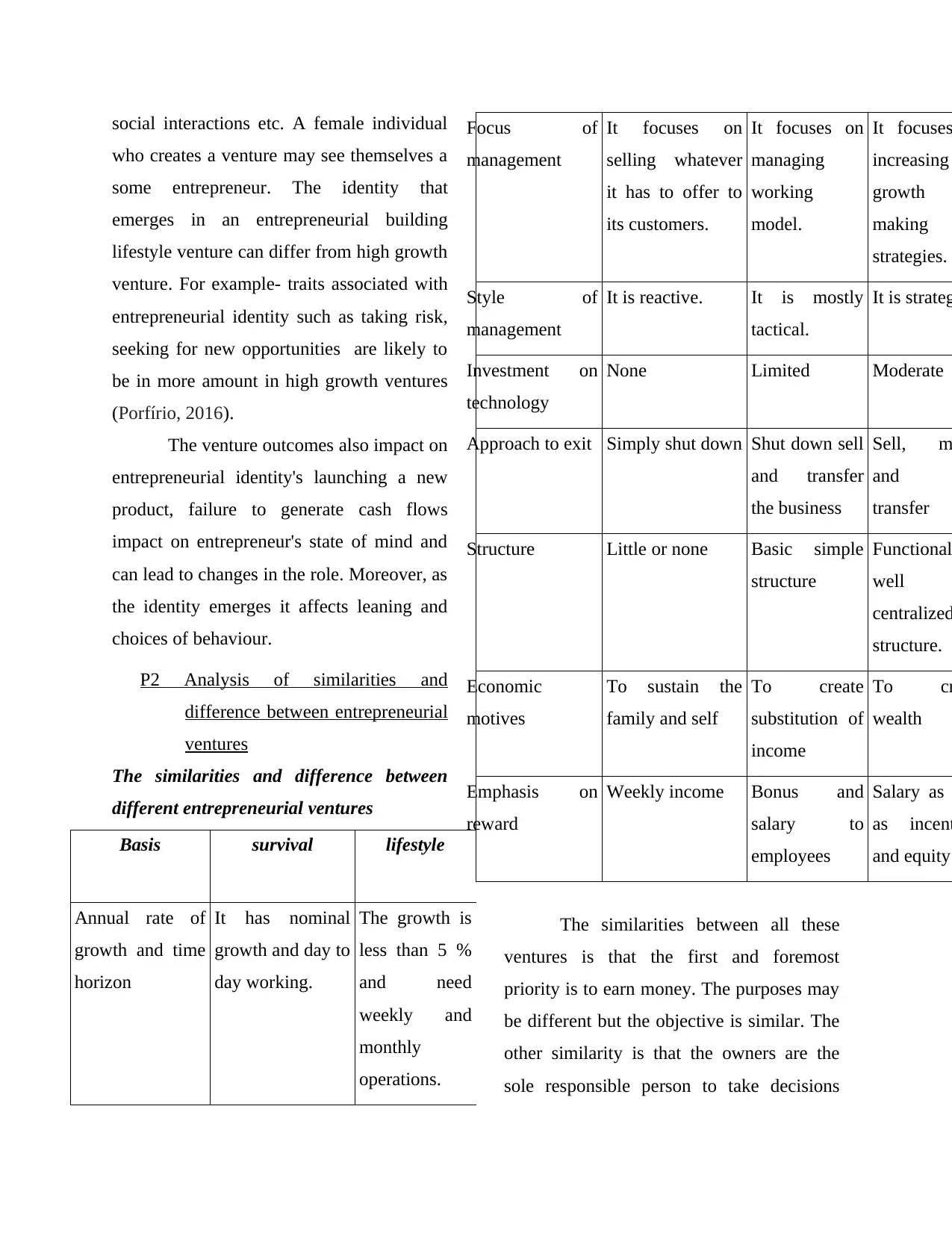
social interactions etc. A female individual
who creates a venture may see themselves a
some entrepreneur. The identity that
emerges in an entrepreneurial building
lifestyle venture can differ from high growth
venture. For example- traits associated with
entrepreneurial identity such as taking risk,
seeking for new opportunities are likely to
be in more amount in high growth ventures
(Porfírio, 2016).
The venture outcomes also impact on
entrepreneurial identity's launching a new
product, failure to generate cash flows
impact on entrepreneur's state of mind and
can lead to changes in the role. Moreover, as
the identity emerges it affects leaning and
choices of behaviour.
P2 Analysis of similarities and
difference between entrepreneurial
ventures
The similarities and difference between
different entrepreneurial ventures
Basis survival lifestyle
Annual rate of
growth and time
horizon
It has nominal
growth and day to
day working.
The growth is
less than 5 %
and need
weekly and
monthly
operations.
Focus of
management
It focuses on
selling whatever
it has to offer to
its customers.
It focuses on
managing
working
model.
It focuses
increasing
growth
making
strategies.
Style of
management
It is reactive. It is mostly
tactical.
It is strateg
Investment on
technology
None Limited Moderate
Approach to exit Simply shut down Shut down sell
and transfer
the business
Sell, m
and
transfer
Structure Little or none Basic simple
structure
Functional
well
centralized
structure.
Economic
motives
To sustain the
family and self
To create
substitution of
income
To cr
wealth
Emphasis on
reward
Weekly income Bonus and
salary to
employees
Salary as
as incent
and equity
The similarities between all these
ventures is that the first and foremost
priority is to earn money. The purposes may
be different but the objective is similar. The
other similarity is that the owners are the
sole responsible person to take decisions
who creates a venture may see themselves a
some entrepreneur. The identity that
emerges in an entrepreneurial building
lifestyle venture can differ from high growth
venture. For example- traits associated with
entrepreneurial identity such as taking risk,
seeking for new opportunities are likely to
be in more amount in high growth ventures
(Porfírio, 2016).
The venture outcomes also impact on
entrepreneurial identity's launching a new
product, failure to generate cash flows
impact on entrepreneur's state of mind and
can lead to changes in the role. Moreover, as
the identity emerges it affects leaning and
choices of behaviour.
P2 Analysis of similarities and
difference between entrepreneurial
ventures
The similarities and difference between
different entrepreneurial ventures
Basis survival lifestyle
Annual rate of
growth and time
horizon
It has nominal
growth and day to
day working.
The growth is
less than 5 %
and need
weekly and
monthly
operations.
Focus of
management
It focuses on
selling whatever
it has to offer to
its customers.
It focuses on
managing
working
model.
It focuses
increasing
growth
making
strategies.
Style of
management
It is reactive. It is mostly
tactical.
It is strateg
Investment on
technology
None Limited Moderate
Approach to exit Simply shut down Shut down sell
and transfer
the business
Sell, m
and
transfer
Structure Little or none Basic simple
structure
Functional
well
centralized
structure.
Economic
motives
To sustain the
family and self
To create
substitution of
income
To cr
wealth
Emphasis on
reward
Weekly income Bonus and
salary to
employees
Salary as
as incent
and equity
The similarities between all these
ventures is that the first and foremost
priority is to earn money. The purposes may
be different but the objective is similar. The
other similarity is that the owners are the
sole responsible person to take decisions
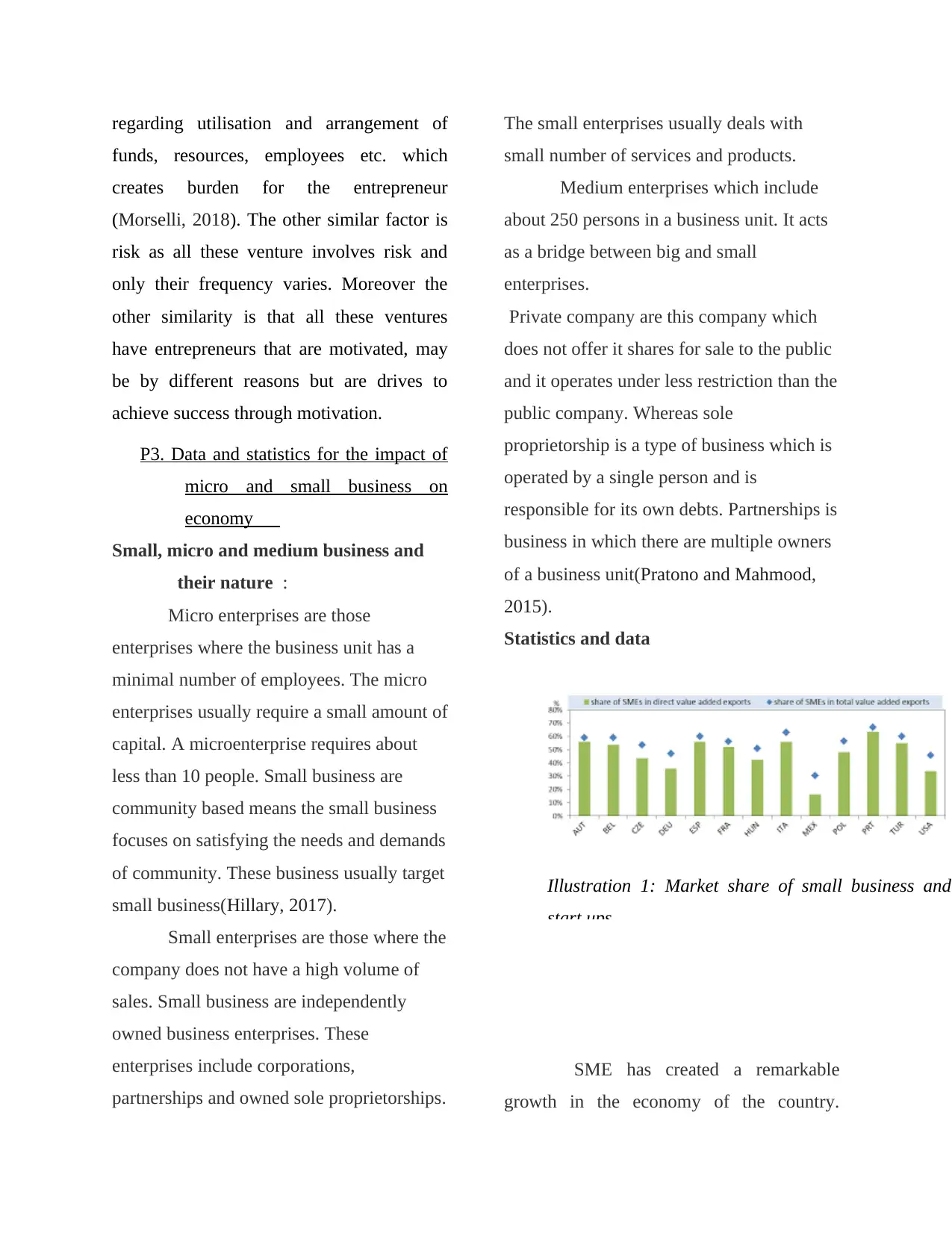
regarding utilisation and arrangement of
funds, resources, employees etc. which
creates burden for the entrepreneur
(Morselli, 2018). The other similar factor is
risk as all these venture involves risk and
only their frequency varies. Moreover the
other similarity is that all these ventures
have entrepreneurs that are motivated, may
be by different reasons but are drives to
achieve success through motivation.
P3. Data and statistics for the impact of
micro and small business on
economy
Small, micro and medium business and
their nature :
Micro enterprises are those
enterprises where the business unit has a
minimal number of employees. The micro
enterprises usually require a small amount of
capital. A microenterprise requires about
less than 10 people. Small business are
community based means the small business
focuses on satisfying the needs and demands
of community. These business usually target
small business(Hillary, 2017).
Small enterprises are those where the
company does not have a high volume of
sales. Small business are independently
owned business enterprises. These
enterprises include corporations,
partnerships and owned sole proprietorships.
The small enterprises usually deals with
small number of services and products.
Medium enterprises which include
about 250 persons in a business unit. It acts
as a bridge between big and small
enterprises.
Private company are this company which
does not offer it shares for sale to the public
and it operates under less restriction than the
public company. Whereas sole
proprietorship is a type of business which is
operated by a single person and is
responsible for its own debts. Partnerships is
business in which there are multiple owners
of a business unit(Pratono and Mahmood,
2015).
Statistics and data
SME has created a remarkable
growth in the economy of the country.
Illustration 1: Market share of small business and
start ups
funds, resources, employees etc. which
creates burden for the entrepreneur
(Morselli, 2018). The other similar factor is
risk as all these venture involves risk and
only their frequency varies. Moreover the
other similarity is that all these ventures
have entrepreneurs that are motivated, may
be by different reasons but are drives to
achieve success through motivation.
P3. Data and statistics for the impact of
micro and small business on
economy
Small, micro and medium business and
their nature :
Micro enterprises are those
enterprises where the business unit has a
minimal number of employees. The micro
enterprises usually require a small amount of
capital. A microenterprise requires about
less than 10 people. Small business are
community based means the small business
focuses on satisfying the needs and demands
of community. These business usually target
small business(Hillary, 2017).
Small enterprises are those where the
company does not have a high volume of
sales. Small business are independently
owned business enterprises. These
enterprises include corporations,
partnerships and owned sole proprietorships.
The small enterprises usually deals with
small number of services and products.
Medium enterprises which include
about 250 persons in a business unit. It acts
as a bridge between big and small
enterprises.
Private company are this company which
does not offer it shares for sale to the public
and it operates under less restriction than the
public company. Whereas sole
proprietorship is a type of business which is
operated by a single person and is
responsible for its own debts. Partnerships is
business in which there are multiple owners
of a business unit(Pratono and Mahmood,
2015).
Statistics and data
SME has created a remarkable
growth in the economy of the country.
Illustration 1: Market share of small business and
start ups
⊘ This is a preview!⊘
Do you want full access?
Subscribe today to unlock all pages.

Trusted by 1+ million students worldwide
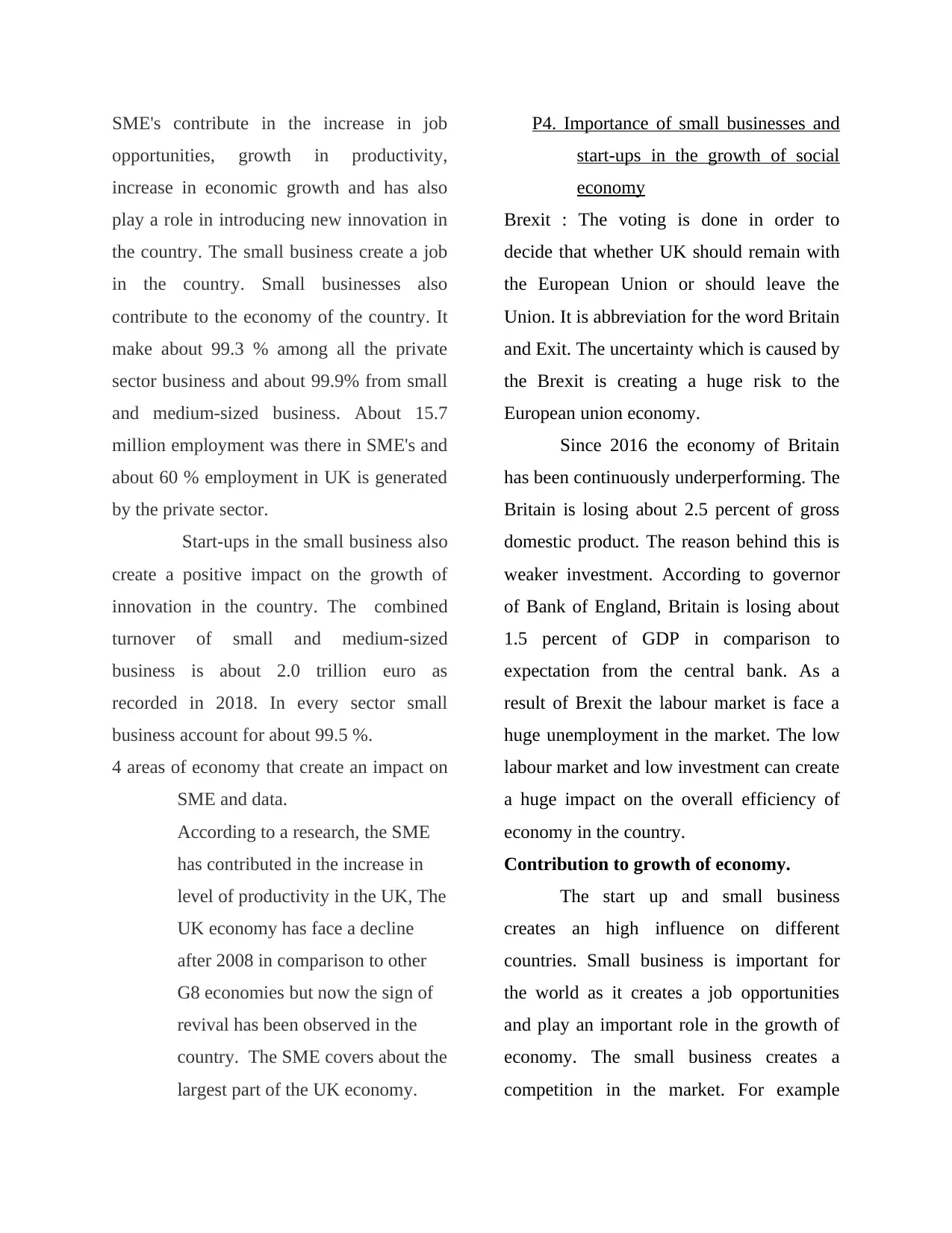
SME's contribute in the increase in job
opportunities, growth in productivity,
increase in economic growth and has also
play a role in introducing new innovation in
the country. The small business create a job
in the country. Small businesses also
contribute to the economy of the country. It
make about 99.3 % among all the private
sector business and about 99.9% from small
and medium-sized business. About 15.7
million employment was there in SME's and
about 60 % employment in UK is generated
by the private sector.
Start-ups in the small business also
create a positive impact on the growth of
innovation in the country. The combined
turnover of small and medium-sized
business is about 2.0 trillion euro as
recorded in 2018. In every sector small
business account for about 99.5 %.
4 areas of economy that create an impact on
SME and data.
According to a research, the SME
has contributed in the increase in
level of productivity in the UK, The
UK economy has face a decline
after 2008 in comparison to other
G8 economies but now the sign of
revival has been observed in the
country. The SME covers about the
largest part of the UK economy.
P4. Importance of small businesses and
start-ups in the growth of social
economy
Brexit : The voting is done in order to
decide that whether UK should remain with
the European Union or should leave the
Union. It is abbreviation for the word Britain
and Exit. The uncertainty which is caused by
the Brexit is creating a huge risk to the
European union economy.
Since 2016 the economy of Britain
has been continuously underperforming. The
Britain is losing about 2.5 percent of gross
domestic product. The reason behind this is
weaker investment. According to governor
of Bank of England, Britain is losing about
1.5 percent of GDP in comparison to
expectation from the central bank. As a
result of Brexit the labour market is face a
huge unemployment in the market. The low
labour market and low investment can create
a huge impact on the overall efficiency of
economy in the country.
Contribution to growth of economy.
The start up and small business
creates an high influence on different
countries. Small business is important for
the world as it creates a job opportunities
and play an important role in the growth of
economy. The small business creates a
competition in the market. For example
opportunities, growth in productivity,
increase in economic growth and has also
play a role in introducing new innovation in
the country. The small business create a job
in the country. Small businesses also
contribute to the economy of the country. It
make about 99.3 % among all the private
sector business and about 99.9% from small
and medium-sized business. About 15.7
million employment was there in SME's and
about 60 % employment in UK is generated
by the private sector.
Start-ups in the small business also
create a positive impact on the growth of
innovation in the country. The combined
turnover of small and medium-sized
business is about 2.0 trillion euro as
recorded in 2018. In every sector small
business account for about 99.5 %.
4 areas of economy that create an impact on
SME and data.
According to a research, the SME
has contributed in the increase in
level of productivity in the UK, The
UK economy has face a decline
after 2008 in comparison to other
G8 economies but now the sign of
revival has been observed in the
country. The SME covers about the
largest part of the UK economy.
P4. Importance of small businesses and
start-ups in the growth of social
economy
Brexit : The voting is done in order to
decide that whether UK should remain with
the European Union or should leave the
Union. It is abbreviation for the word Britain
and Exit. The uncertainty which is caused by
the Brexit is creating a huge risk to the
European union economy.
Since 2016 the economy of Britain
has been continuously underperforming. The
Britain is losing about 2.5 percent of gross
domestic product. The reason behind this is
weaker investment. According to governor
of Bank of England, Britain is losing about
1.5 percent of GDP in comparison to
expectation from the central bank. As a
result of Brexit the labour market is face a
huge unemployment in the market. The low
labour market and low investment can create
a huge impact on the overall efficiency of
economy in the country.
Contribution to growth of economy.
The start up and small business
creates an high influence on different
countries. Small business is important for
the world as it creates a job opportunities
and play an important role in the growth of
economy. The small business creates a
competition in the market. For example
Paraphrase This Document
Need a fresh take? Get an instant paraphrase of this document with our AI Paraphraser
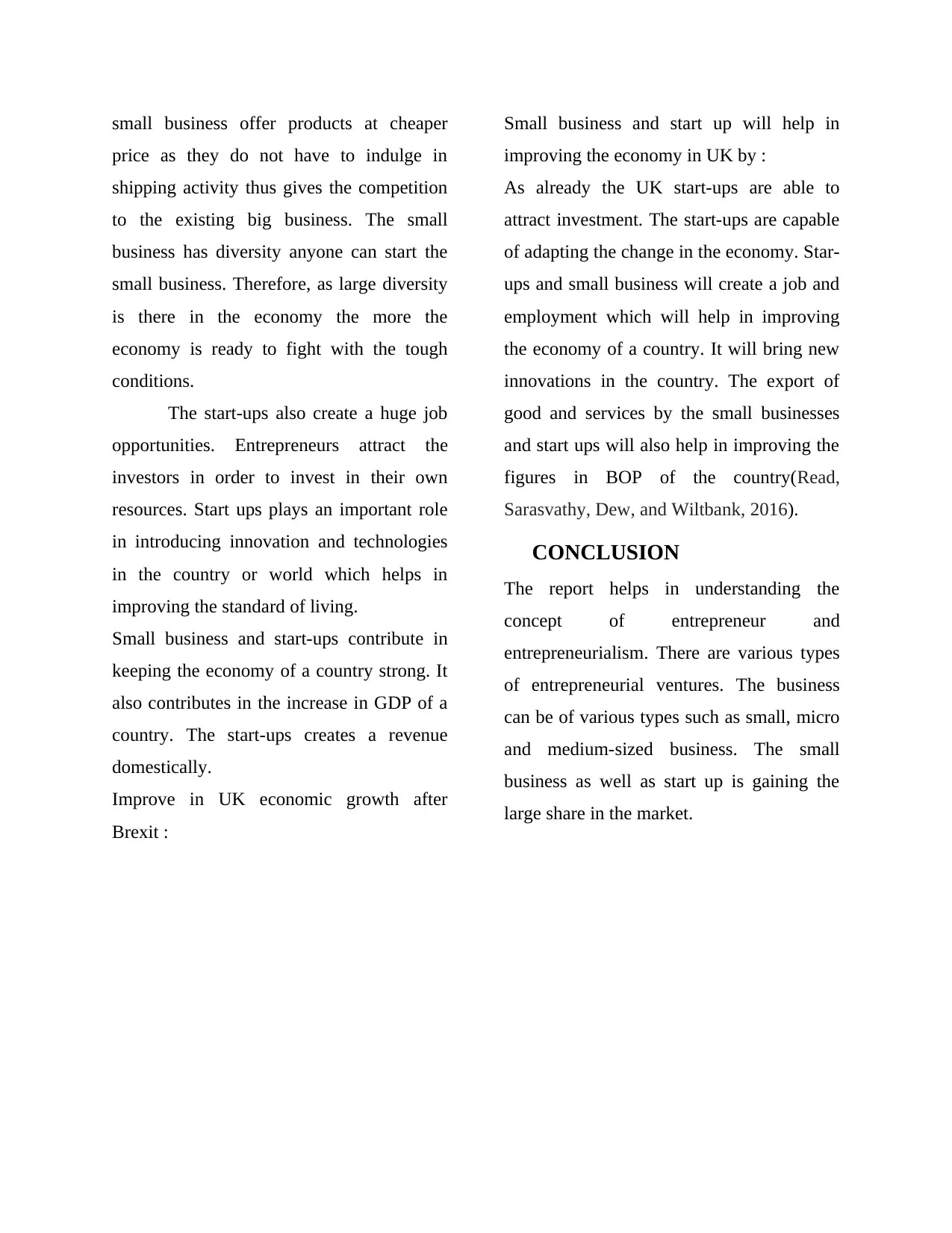
small business offer products at cheaper
price as they do not have to indulge in
shipping activity thus gives the competition
to the existing big business. The small
business has diversity anyone can start the
small business. Therefore, as large diversity
is there in the economy the more the
economy is ready to fight with the tough
conditions.
The start-ups also create a huge job
opportunities. Entrepreneurs attract the
investors in order to invest in their own
resources. Start ups plays an important role
in introducing innovation and technologies
in the country or world which helps in
improving the standard of living.
Small business and start-ups contribute in
keeping the economy of a country strong. It
also contributes in the increase in GDP of a
country. The start-ups creates a revenue
domestically.
Improve in UK economic growth after
Brexit :
Small business and start up will help in
improving the economy in UK by :
As already the UK start-ups are able to
attract investment. The start-ups are capable
of adapting the change in the economy. Star-
ups and small business will create a job and
employment which will help in improving
the economy of a country. It will bring new
innovations in the country. The export of
good and services by the small businesses
and start ups will also help in improving the
figures in BOP of the country(Read,
Sarasvathy, Dew, and Wiltbank, 2016).
CONCLUSION
The report helps in understanding the
concept of entrepreneur and
entrepreneurialism. There are various types
of entrepreneurial ventures. The business
can be of various types such as small, micro
and medium-sized business. The small
business as well as start up is gaining the
large share in the market.
price as they do not have to indulge in
shipping activity thus gives the competition
to the existing big business. The small
business has diversity anyone can start the
small business. Therefore, as large diversity
is there in the economy the more the
economy is ready to fight with the tough
conditions.
The start-ups also create a huge job
opportunities. Entrepreneurs attract the
investors in order to invest in their own
resources. Start ups plays an important role
in introducing innovation and technologies
in the country or world which helps in
improving the standard of living.
Small business and start-ups contribute in
keeping the economy of a country strong. It
also contributes in the increase in GDP of a
country. The start-ups creates a revenue
domestically.
Improve in UK economic growth after
Brexit :
Small business and start up will help in
improving the economy in UK by :
As already the UK start-ups are able to
attract investment. The start-ups are capable
of adapting the change in the economy. Star-
ups and small business will create a job and
employment which will help in improving
the economy of a country. It will bring new
innovations in the country. The export of
good and services by the small businesses
and start ups will also help in improving the
figures in BOP of the country(Read,
Sarasvathy, Dew, and Wiltbank, 2016).
CONCLUSION
The report helps in understanding the
concept of entrepreneur and
entrepreneurialism. There are various types
of entrepreneurial ventures. The business
can be of various types such as small, micro
and medium-sized business. The small
business as well as start up is gaining the
large share in the market.

Bibliography
https://www.routledge.com/Government-SMEs-and-Entrepreneurship-Development-Policy-
Practice-and/Blackburn-Schaper/p/book/9781409430353
https://www.sciencedirect.com/science/article/pii/S1877042815058747
https://www.emeraldinsight.com/doi/full/10.1108/ET-03-2017-0046
https://kunnskapsverket.org/litteraturdatabase/publikasjon/entrepreneurship-different-contexts-
cultural-and-creative-industries
https://www.routledge.com/Government-SMEs-and-Entrepreneurship-Development-Policy-
Practice-and/Blackburn-Schaper/p/book/9781409430353
https://www.sciencedirect.com/science/article/pii/S1877042815058747
https://www.emeraldinsight.com/doi/full/10.1108/ET-03-2017-0046
https://kunnskapsverket.org/litteraturdatabase/publikasjon/entrepreneurship-different-contexts-
cultural-and-creative-industries
⊘ This is a preview!⊘
Do you want full access?
Subscribe today to unlock all pages.

Trusted by 1+ million students worldwide
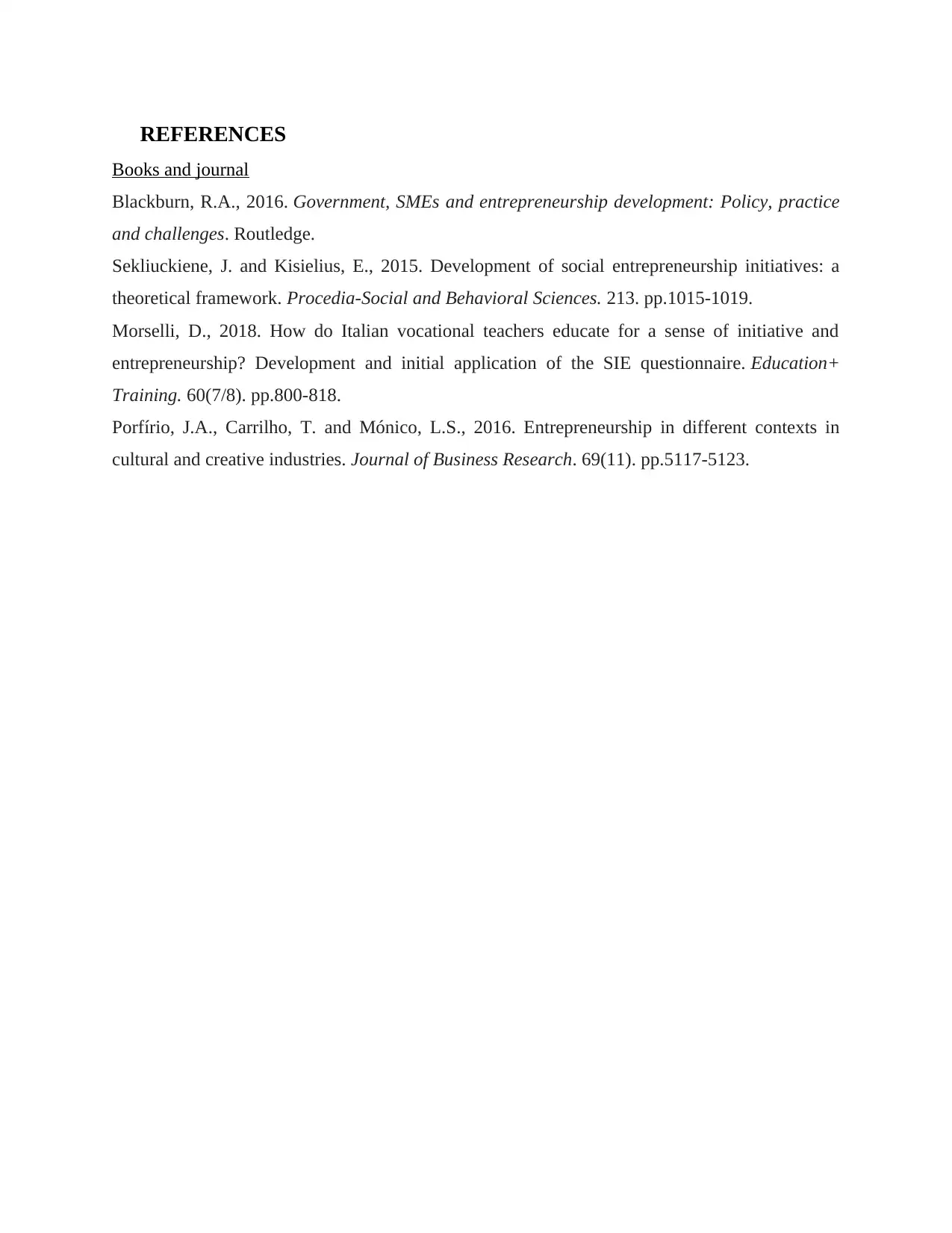
REFERENCES
Books and journal
Blackburn, R.A., 2016. Government, SMEs and entrepreneurship development: Policy, practice
and challenges. Routledge.
Sekliuckiene, J. and Kisielius, E., 2015. Development of social entrepreneurship initiatives: a
theoretical framework. Procedia-Social and Behavioral Sciences. 213. pp.1015-1019.
Morselli, D., 2018. How do Italian vocational teachers educate for a sense of initiative and
entrepreneurship? Development and initial application of the SIE questionnaire. Education+
Training. 60(7/8). pp.800-818.
Porfírio, J.A., Carrilho, T. and Mónico, L.S., 2016. Entrepreneurship in different contexts in
cultural and creative industries. Journal of Business Research. 69(11). pp.5117-5123.
Books and journal
Blackburn, R.A., 2016. Government, SMEs and entrepreneurship development: Policy, practice
and challenges. Routledge.
Sekliuckiene, J. and Kisielius, E., 2015. Development of social entrepreneurship initiatives: a
theoretical framework. Procedia-Social and Behavioral Sciences. 213. pp.1015-1019.
Morselli, D., 2018. How do Italian vocational teachers educate for a sense of initiative and
entrepreneurship? Development and initial application of the SIE questionnaire. Education+
Training. 60(7/8). pp.800-818.
Porfírio, J.A., Carrilho, T. and Mónico, L.S., 2016. Entrepreneurship in different contexts in
cultural and creative industries. Journal of Business Research. 69(11). pp.5117-5123.
1 out of 10
Related Documents
Your All-in-One AI-Powered Toolkit for Academic Success.
+13062052269
info@desklib.com
Available 24*7 on WhatsApp / Email
![[object Object]](/_next/static/media/star-bottom.7253800d.svg)
Unlock your academic potential
Copyright © 2020–2026 A2Z Services. All Rights Reserved. Developed and managed by ZUCOL.
![Entrepreneurship and Small Business Management Report - [Course Name]](/_next/image/?url=https%3A%2F%2Fdesklib.com%2Fmedia%2Fimages%2Fbz%2F6266c519a1da402abc4b601351e18425.jpg&w=256&q=75)




